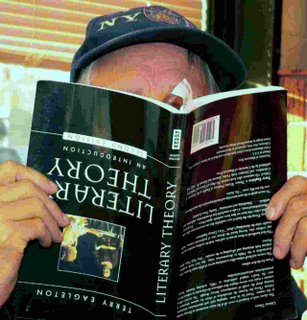Nobody is an Authority on Nuttin' - But We Try

Blogaulaire likes to jerk people's heads around . . around the very same issues he finds his own head is being jerked around. I guess misery loves company, or something like that.
Perhaps I think that I am an iconoclast. I like to break up other people's preconceived notions and the icons of complacency that rule in their thinking in their little niche, their little nest. I would like to think of myself as a radical, able to 'get at' the root of, the core of, things . . without pussy-footing around with other people's preconceived notions.
But what those descriptive, value-laden words above amount to is merely one more of the most familiar North American stereotypes that are current (and have been for a long time) current among the ranks of Young Turks practicing journalism, literature and/or among today's million-member mass of the scribes who blog on the Internet today. So even THAT image of me as an iconoclast is hardly worth a hill of beans!
There are many, many challenges facing the bookselling trade today.
And there are many, many booksellers who are failing to meet these challenges while many others are succeeding financially in today's market. Where I place myself is as one who is outside this sort of mêlée yet one who can, while learning from others, see through many conceptual traps booksellers are laying down for themselves as they attempt to see through each challenge that presents itself.
Blogaulaire refuses to jump into the groove of those who complacently argue that somehow 'we' (the booksellers) will muddle through. And I see a large gap between the successful booksellers who fit neatly into their local community of book readers/bookstore patrons and the unsuccessful ones who have not made a similar organic connection with their own local book-buying public.
At times, pessimistically (with a touch of hubris, admittedly) Blogaulaire smirks at the emails on a listerv written by wise-old book purveyors who seem totally preoccupied with queries about how to connect with buyers on the Internet. I say to myself, self says I, maybe they should first start worrying about their disconnect with their own local community. In fact, I know deep down that these wizened owners of brick 'n' mortar bookstores have given up on their own local community because that particular community is no longer rushing their bookstore to buy more books!
So people who no longer have a face-to-face community are looking for a virtual community. But, wonder of wonders, it seems that everybody and her brother is searching for the same thing! They are all uploading their titles to the half-dozen or more meta-vendor websites and, generally, slashing their prices. The iconoclast in me says "Duh?". The realist in me asks "What do we do about it? How do we resolve all these obvious disconnects between these book sellers and their clienele, and the book suppliers (the pickers) who are suddenly The Competition?"
What I see that is stable and continuing to flourish surrounded by this maelstrom of turbulence is the voluntaristic approach of non-profit book fairs, such as the University of McGill's and the Sir Thomas More Institute's book sales in Montreal or any one of the even more local sales such as Verdun's St. Willibrord's Church's monthly event. (Plus, I could name a dozen mor local book fairs on the West Island).
Obviously, the worst prescription to offer to anyone working to put meat on the table is to tell that person to go out and volunteer their time and forget about earning money. Yet there are elements of the book fair that can be brought into the formula for the commercial boutique bookstore owner.
Let me just name a few for starters with the caveat that more experienced people could parse such a list better than I could discuss these issues.
Publicity. The fairs are announced in public service announcements in the local papers.
Support. Large numbers of residents attend because it is 'for a good cause.'
Price. Everybody expects bargain prices - even the pickers who intend to list their treasure discoveries on ABE and e-Bay.
Timing. The events are announced well in advance and last, at the most, a couple days.
Space. Charity events do not pay rent and they have access, normally, to vast spaces such as auditoriums and church basements.
Volunteers. The grunge work is done by unpaid, usually enthusiastic, members of the community.
Expertise. Retired leaders from the bookish professions serve as unpaid co-ordinators.
Few constraints to turn a profit or pay out a percentage. I think I'm on weaker ground on this one. Maybe there is more pressure from 'the administration' to turn in a good income than some of us realize.
I think I've listed enough elements that describe the volunteer sector of used book selling. Let me just list another, singular, element -- then I can pat myself on the back self-righteously for being an iconoclast:
----------------------------------------------
One thing that
The book fair people know --
HOW TO TAKE OUT THE TRASH
WHEN THE PARTY'S OVER !!!
I think that commercial bookstore owners have a handle on ALL of the basic elements listed above -- or at least they seem to in their own email discussions -- but that as a group they are unwilling to air-out in public purview two subjects. The following points are the dirty laundry of the book trade.

What is not being discussed, in my humble opinion, follows:
When a bookstore no longer enjoys local, public support, the owner has to be hog-tied and practically tortured to admit this is so. Not that I think all this is their own fault. But book people really do need to take personal ownership of how, why and the commercial consequences of losing the support of their local community.
This seems fundamental. Especially in communities where the book fairs thrive and the bookstores do not.
The second point is neither openly discussed by the book fair people nor by the bookstore owners, viz: How do you get rid of the left-overs at the end of the day?
Because, if and when the book event and sales venue has community backing from the grassroots, that same public will inundate you-the-bookseller with all kinds of books, including titles that no one in his or her right mind would want to purchase and take home. And to stock and store these books at your own expense will cost YOU money and/or valuable resources like floor space.
Do you send these leftover books to Africa on the next freighter out? Then pity the poor Africans is what I will add. (But of course you don't send them abroad . . that, at least, is one urban myth of the book trade we can quickly dismiss.)
There remains one final point to all this: The book fair people do try to head off the magazines, old newspapers and unsalable print material at the door before it becomes a burden to their organization. But when the commercial bookseller tries to head off 'trash' coming in from a regular, loyal customer, this puts the store owner in the role of a snarky, penny pinching and mean gatekeeper.
But who knows. Maybe the next load of books this same patron drops off will be loaded with priceless treasures?
You don't want to look mean to such a bountiful supplier as this well meaning customer, now do you?
At the end of the day and the end of this long post, what I advocate is that bricks 'n' mortar bookstore owners try to emulate that same communty-based formula that works so well in the volunteer sector I counsel all of us to remain as graciously in the good graces of even the most benighted client. Be as friendly to them as possible.
The shopkeeper must have a quick EXIT STRATEGEY. A backdoor procedure that centres around some local friend with a good pickup truck. A guy or gal who will help haul all of what is mere 'printed material' from your store's receiving end to the shipping end at the back of the store -- STRAIGHT to the collection bins at the local recycling or paper-drive collection centre!
Short of everybody closing shop and operating out of their own basement or apartment, Blogaulaire's proposal to bookstore owners about reconnecting with their communities (while still remaining Spartan about display and storage space), PLUS the idea of holding big open-door sales evebts, are topics that deserve more wide discussion by book bloggers and subscribers to bookish email listservs.















